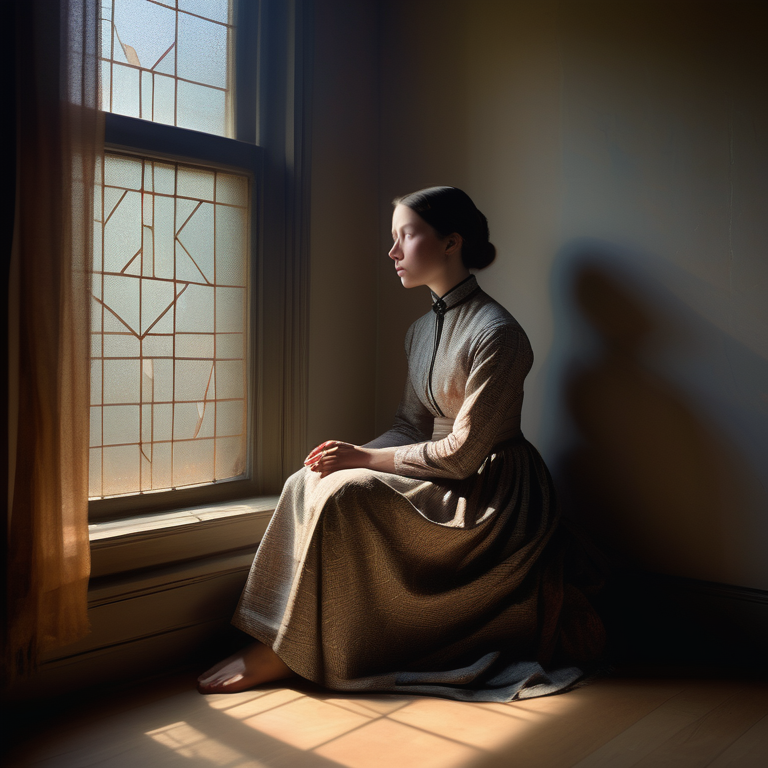Kate Chopin’s Exploration of Female Sexual Awakening

Key Highlights
- Kate Chopin was a pioneering author in the exploration of female sexuality and sexual awakening in the late nineteenth century.
- Her works, such as “The Awakening,” “The Story of an Hour,” and “A Respectable Woman,” societal norms and shed light on the sexual liberation of women.
- Chopin’s portrayal of female characters experiencing sexual awakening was met with controversy and criticism during her time, but has since been recognized as groundbreaking in the field of literary criticism.
- Her exploration of female sexual liberation and the psychological aspects of sexuality continue to resonate with readers today.
- Chopin’s legacy as an early feminist and her contribution to the discussion of gender and sexuality remain relevant in contemporary literature and culture.
Introduction
Kate Chopin, an American author, is best known for her exploration of female sexual awakening in her works. During the late nineteenth century, when discussions of female sexuality were taboo, Chopin fearlessly delved into the subject, challenging societal norms and shedding light on the sexual liberation of women. Through her stories, she captured the complexities and nuances of female desire, shedding light on the inner lives of her characters and exploring themes of sexual awakening, repression, and self-discovery. Chopin’s exploration of female sexuality has been a topic of literary criticism and has sparked important discussions about gender, sexuality, and the role of women in society. Her works continue to be celebrated for their bold and honest portrayal of female sexual awakening, making her a pioneering figure in the field of feminist literature. In this blog, we will delve into the life and works of Kate Chopin, examining the impact of her writings on the exploration of female sexual awakening, and exploring the societal reception and legacy of her themes.
The Life and Times of Kate Chopin
Kate Chopin was born in St. Louis, Missouri, in 1850. She grew up in a wealthy and socially prominent family. After marrying Oscar Chopin, she moved to Louisiana, where she lived for most of her life. It was during her time in Louisiana that she developed a deep appreciation for the region’s culture, which would later influence her writing. Chopin’s literary career began after the death of her husband. She lived in New York for a period of time and immersed herself in the literary scene there. Her experiences and observations of upper-class society in both New York and Louisiana provided material for her stories, which often touched on themes of social class and gender roles.
Early Life Influences on Chopin’s Writing
Chopin’s upbringing in Louisiana greatly influenced her writing. Growing up in a region with a unique cultural blend of French, Spanish, and African traditions, she was exposed to a different perspective on gender roles and female sexuality. This cultural context played a significant role in shaping her understanding of the complexities of female desire and sexual awakening. Additionally, Chopin’s own experiences as a woman in the American South during the late nineteenth century informed her exploration of themes related to gender and sexuality. Her observations of societal expectations and the limitations placed on women during this time period are reflected in her stories, which often depict the struggles and desires of women navigating societal norms and expectations.
Chopin’s Literary Career and Its Impact
Chopin’s literary career began after the death of her husband, when she turned to writing as a means of supporting herself and her children. She published her first collection of short stories, “Bayou Folk,” in 1894, which received positive reviews and established her as a talented writer. However, it was the publication of “The Awakening” in 1899 that would solidify her place in literary history. The novel, which centers around a woman’s sexual awakening and her subsequent struggle against societal expectations, received both praise and criticism for its frank portrayal of female desire. Despite the controversy, Chopin’s work had a lasting impact on the literary world, and her stories continue to be studied and celebrated for their exploration of female sexuality and the complexities of human existence. Her stories were published in popular magazines such as the Atlantic Monthly, further cementing her reputation as a talented writer and a voice for women’s rights and sexual liberation.
The Theme of Female Sexual Awakening in Chopin’s Works
A recurring theme in Chopin’s works is the exploration of female sexual awakening. Through her stories, she gives voice to women who are discovering their desires, challenging societal expectations, and seeking sexual liberation. This theme is particularly evident in her most famous work, “The Awakening,” which follows the journey of Edna Pontellier as she awakens to her own sexual desires and seeks autonomy in a society that restricts women’s freedoms. Chopin skillfully portrays the internal struggles and conflicts faced by her female characters as they navigate their sexual selves, shedding light on the complexities of female sexuality and the quest for personal fulfillment.
Analyzing “The Awakening”
“The Awakening” is widely regarded as one of Chopin’s most significant works, exploring themes of sexual awakening, female desire, and the constraints of societal expectations. The protagonist, Edna Pontellier, experiences a profound internal transformation as she becomes aware of her own sexual energy and desires. Through Edna’s journey, Chopin delves into the complexity of human existence and the societal pressures that often lead to sexual shame and repression. The novel challenges traditional notions of femininity and marriage, portraying Edna’s pursuit of personal fulfillment at the expense of societal conventions. “The Awakening” continues to be celebrated for its honest and nuanced portrayal of female sexuality, and its exploration of themes that were considered controversial at the time of its publication.
Short Stories That Highlight Sexual Independence
- In addition to her novel “The Awakening,” Chopin’s collection of short stories also explores themes of female sexual independence and the challenges faced by women in a restrictive society.
- “A Respectable Woman” tells the story of a married woman who experiences a sexual attraction to a family friend, challenging societal expectations of fidelity and monogamy.
- “The Story of an Hour” explores the liberation felt by a woman upon learning of her husband’s death, as she imagines a life free from the constraints of marriage.
- “The Storm” depicts a passionate extramarital affair, challenging the notion of female sexuality as passive and submissive.
- Through these short stories, Chopin sheds light on the complexity of female desire and the ways in which women navigate societal expectations to assert their own sexual independence.
Societal Reception of Chopin’s Themes
Chopin’s exploration of female sexuality and sexual awakening was met with a mixed reception during her time. While some readers and critics praised her bold and honest portrayal of women’s desires and struggles, others were shocked by her frankness and the challenges she posed to societal norms. The themes of sexual liberation and the physiological changes that accompany sexual awakening were particularly controversial. Chopin’s works were seen as provocative and subversive, challenging traditional notions of femininity and eliciting discussions about the role of women in society and the sexual revolution of the time.
Initial Critical Reception and Controversy
When “The Awakening” was first published, it received a mix of praise and criticism. Some readers and critics applauded Chopin’s bold portrayal of a woman’s sexual desires and her quest for personal fulfillment. However, the novel also faced significant backlash and controversy. The open discussion of female sexuality and the exploration of themes such as infidelity and sexual desire challenged the prevailing notions of femininity and morality. Many readers found the frankness and honesty of Chopin’s writing unsettling and morally objectionable. The controversy surrounding “The Awakening” ultimately led to a decline in Chopin’s literary career, as some publishers and readers shied away from her work. It wasn’t until the resurgence of interest in her writings in the late twentieth century that her work gained the recognition it deserved.
The Evolution of Chopin’s Legacy in Feminist Literature
Chopin’s work has had a significant impact on feminist literature and the exploration of female sexuality. Her writings laid the foundation for future feminist authors to address themes of sexual liberation and the complexities of female desire. Chopin’s honest and nuanced portrayal of female characters experiencing sexual awakening has inspired countless authors to explore similar themes in their own works. Additionally, her contributions to literary criticism have shaped discussions around feminism, sexuality, and the role of women in society. The table below highlights some of the key aspects of Chopin’s legacy in feminist literature:
|
Aspect |
Description |
|
Exploration of female sexuality |
Chopin’s writings were among the first to openly discuss and explore female desire and sexual awakening, paving the way for future authors |
|
Challenging societal norms |
Chopin’s stories challenged traditional notions of gender roles and expectations, sparking important discussions about women’s rights |
|
Influence on feminist literature |
Chopin’s work inspired future feminist authors to address themes of sexual liberation and the complexities of female desire |
|
Contribution to literary criticism |
Chopin’s writings have been the subject of extensive literary criticism, with scholars examining her exploration of gender and sexuality |
|
Legacy in discussions of feminism and sexuality |
Chopin’s work continues to be celebrated for its contributions to feminist literature and its exploration of female sexual awakening |
Psychological Perspectives on Chopin’s Characters
Chopin’s exploration of female sexual awakening goes beyond the physical aspects and delves into the psychological implications of sexual desire and liberation. Her characters experience a range of emotions, from the excitement and energy associated with sexual awakening to the shame and guilt often imposed by societal norms. Chopin’s portrayal of these psychological changes reflects the complexity of human sexuality and the internal conflicts faced by individuals navigating their desires in a restrictive society. Through her characters, she highlights the transformative power of sexual awakening and the importance of embracing one’s own desires and sense of self.
The Role of the Psyche in Female Sexual Awakening
The exploration of female sexual awakening in Chopin’s works delves into the psyche of her characters and the internal journey they undertake to discover their own sexual selves. Chopin’s stories often depict the first time a character experiences sexual desire, highlighting the transformative power of this realization. The psychological aspects of sexual awakening are intricately linked to an individual’s sense of self and their understanding of their own desires. Through her exploration of the psyche, Chopin challenges societal norms and sheds light on the importance of sexual selection and individual autonomy in the pursuit of sexual fulfillment.
Symbolism and Its Interpretation
Symbolism plays a significant role in Chopin’s exploration of female sexual awakening. Through the use of symbols, such as water, birds, and nature, Chopin conveys the depth and complexity of human sexuality and desire. These symbols serve as metaphors for intimacy, orgasm, and the exploration of one’s own desires and passions. By employing symbolism, Chopin invites readers to interpret and engage with the themes of her work on a deeper level, tapping into the universal human experience. The use of symbolism enhances the richness and depth of her stories, allowing readers to connect with the characters and their journeys of self-discovery and sexual awakening.
Comparative Analysis with Contemporary Narratives
Chopin’s exploration of female sexuality and sexual awakening in the late nineteenth century continues to resonate with contemporary narratives. In modern literature and popular culture, there is an ongoing dialogue about female desire, pleasure, and the complexities of sexuality. Contemporary works often challenge traditional notions of femininity and explore the intersections of gender, sexuality, and identity. These narratives reflect the evolving understanding and acceptance of female sexuality in contemporary society. While the context and language may have changed, the themes and questions raised by Chopin’s works continue to be relevant in contemporary discussions about America, God, pornography, masturbation, and the diverse experiences and desires of women.
Chopin vs. Modern Depictions of Female Sexuality
Chopin’s portrayal of female sexuality in her works differs from modern depictions in several ways. While Chopin’s characters navigate societal restrictions and explore their desires, modern narratives often embrace female sexuality more openly. Modern depictions may focus on female characters who embrace their sexual agency and actively pursue their desires, challenging traditional notions of passivity and submission. Additionally, modern narratives may explore a wider range of sexual experiences, including non-heteronormative relationships and diverse expressions of desire. However, both Chopin’s works and modern depictions share a common thread: the exploration of female lust and the multifaceted nature of female sexual desire. Through these depictions, they challenge societal expectations and contribute to a broader understanding of female sexuality.
How Chopin Paved the Way for Future Discussions
Chopin’s exploration of female sexual awakening and her portrayal of female desire laid the foundation for future discussions about gender and sexuality. By fearlessly addressing societal taboos and challenging traditional norms, Chopin paved the way for more open and honest conversations about female arousal and desire. Her work continues to inspire artists, writers, and scholars to push the boundaries of societal expectations and explore the multifaceted nature of human sexuality. Chopin’s courageous exploration of female desire and her refusal to shy away from controversial topics have had a lasting impact on American literature and have contributed to a broader understanding of the complexities of human sexuality.
The Awakening’s Influence on Literature and Culture
“The Awakening” has had a significant influence on literature and culture since its publication. The novel’s exploration of female sexuality and its bold portrayal of a woman’s sexual awakening challenged societal norms and sparked important discussions about women’s rights and sexual liberation. Chopin’s depiction of Louisiana’s culture and traditions in “The Awakening” also contributed to a broader appreciation and understanding of the region’s unique history and heritage. The novel’s impact continues to be felt in academic circles and popular culture, cementing its place as a landmark work in American literature and a testament to the power of female storytelling.
Literature That Echoes Chopin’s Themes
Chopin’s exploration of female sexual awakening has influenced numerous works of literature that echo her themes. Authors such as Anaïs Nin, Sylvia Plath, and Virginia Woolf have tackled similar themes of female desire, sexual liberation, and the complexities of human intimacy. Their works, such as Nin’s “Delta of Venus,” Plath’s “The Bell Jar,” and Woolf’s “Mrs. Dalloway,” delve into the inner lives of their female characters, exploring their desires, fears, and struggles. These works, like Chopin’s, challenge societal expectations and shed light on the width and depth of female sexuality. They continue to captivate readers and contribute to ongoing discussions about the richness and complexity of human desire.
Chopin’s Relevance in Today’s Culture
Chopin’s exploration of female sexual awakening remains relevant in today’s culture, as discussions about gender, sexuality, and sexual liberation continue to evolve. Her honest portrayal of female desire and the challenges faced by women navigating societal expectations resonates with contemporary audiences, contributing to ongoing conversations about the importance of sexual agency and autonomy. Chopin’s works challenge traditional narratives about gender and sexuality, highlighting the significance of exploring one’s desires and embracing the multifaceted nature of human sexuality. In a society that often focuses on male desire and pleasure, Chopin’s writings provide a valuable perspective and invite readers to consider the complexities of female sexuality beyond stereotypes and assumptions.
Conclusion
Kate Chopin’s exploration of female sexual awakening remains a timeless and provocative subject in literature. Through her works, she challenged societal norms and paved the way for future discussions on gender and sexuality. Chopin’s characters, like those in “The Awakening,” embody early feminist ideals and continue to resonate with contemporary audiences. Her legacy endures, influencing modern narratives and cultural conversations. By delving into the psyche and utilizing symbolism, Chopin established herself as a trailblazer in feminist literature. The evolution of her writings continues to spark meaningful dialogues on female empowerment and individual agency. What are your thoughts on Kate Chopin’s impactful legacy? Comment below.
Frequently Asked Questions
What inspired Kate Chopin to write about female sexual awakening?
Kate Chopin’s own observations of societal expectations and the limitations placed on women during the late nineteenth century inspired her to delve into the exploration of female sexual awakening. Her personal experiences and the cultural context of her time influenced her understanding of the complexities of female desire and sexual liberation.
How were Chopin’s works received by her contemporaries?
Chopin’s works were met with mixed reception by her contemporaries. While some readers and critics praised her bold portrayal of female sexuality, others were shocked and criticized her frankness. The controversial nature of her works led to a decline in her literary career during her lifetime.
In what ways does Chopin’s exploration of female sexuality challenge societal norms?
Chopin’s exploration of female sexuality challenges societal norms by portraying women who defy expectations and seek sexual liberation. Her writings challenge traditional notions of femininity and marriage, inviting readers to question societal expectations and embrace the complexities of human desire.
Can Chopin’s characters be seen as early feminists?
Chopin’s characters can be seen as early feminists in their pursuit of personal fulfillment and sexual agency. They challenge societal expectations and assert their own desires, reflecting the emerging feminist ideals of the late nineteenth century.
How has the perception of Chopin’s work changed over time?
The perception of Chopin’s work has changed over time. Initially met with controversy and criticism, her writings are now recognized as groundbreaking in their exploration of female sexual awakening and have gained widespread acclaim for their honest and nuanced portrayal of women’s desires and struggles.
What impact does Chopin’s writing have on contemporary discussions about gender and sexuality?
Chopin’s writing continues to have a significant impact on contemporary discussions about gender and sexuality. Her exploration of female sexual awakening challenges traditional narratives and contributes to ongoing conversations about the complexities of human desire and the importance of sexual agency.





